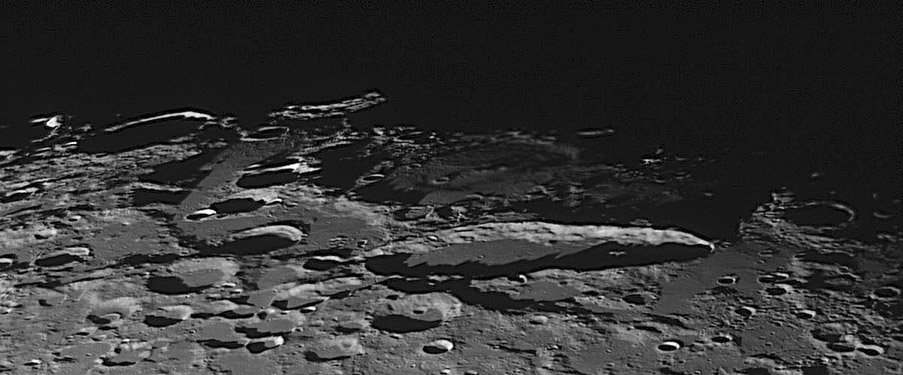March 29, 2024
Have You Knowingly Seen This Basin?
Originally published March 15, 2014

image by Claude Navarro, Toulouse (France)
With the very high resolution topographic digital terrain data from LRO it is possible to create or recreate any illumination for any piece of the lunar surface. Despite that capability it is personally wondrous to come across at the telescope such spectacular lighting as Claude captured here. Hartmann and Kuiper called this two-ring basin the Basin Near Schiller when they first described it in the early 1960s, but the quasi-official name is the Schiller-Zucchius Basin. Both names tell you that it is near Schiller, the almost cigar-snapped crater at center right. The main basin rim (335 km in diameter) is best displayed to the left of Schiller, where it curves around towards Zucchius, whose near rim only is illuminated at the terminator. At the snout end of Schiller a surprisingly strong shadow is cast by the very low basin rim to the north. Both sides of the 175 km wide inner basin ring are visible, and what this lighting shows very well is the rounded drop off of an inner, inner ring. Three small hills inside the inner, inner ring are usually inconspicuous, but this shadow-magnification reveals them clearly. The SZB is an old basin, and while there may be ancient basalts in it, the visible smooth material is largely fluidized ejecta from the formation of the Orientale Basin.
Chuck Wood
I always need to thank Claude for being one of the translators of LPOD into the French l'image lunaire du jour!
Technical Details
March/12/2014, 20:45 UT. C14 + Basler 1300 + IR pass 685. 250 images (on 2000) processed with AS2! and Registax 6.
Related Links
21st Century Atlas charts 24 & B8.
Yesterday's LPOD: First Time Observers Map
Tomorrow's LPOD: The Hills Were Once Alive, but There Was No Music
COMMENTS?
Register, Log in, and join in the comments.



